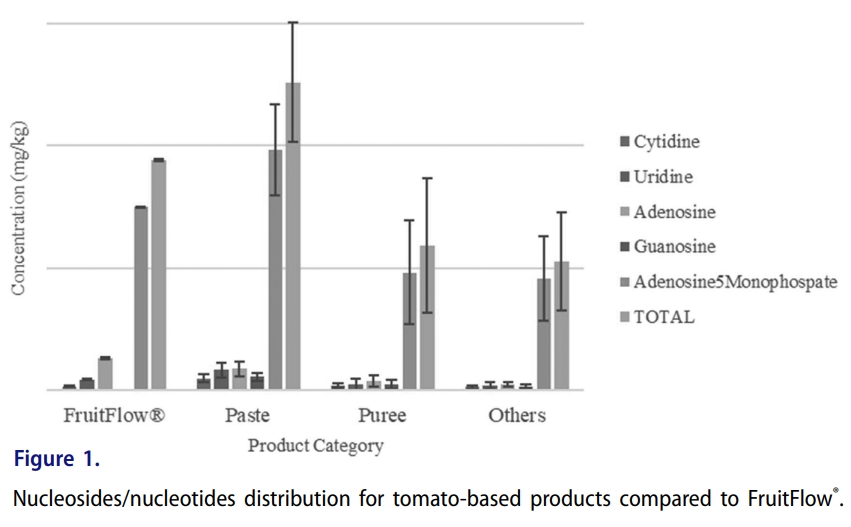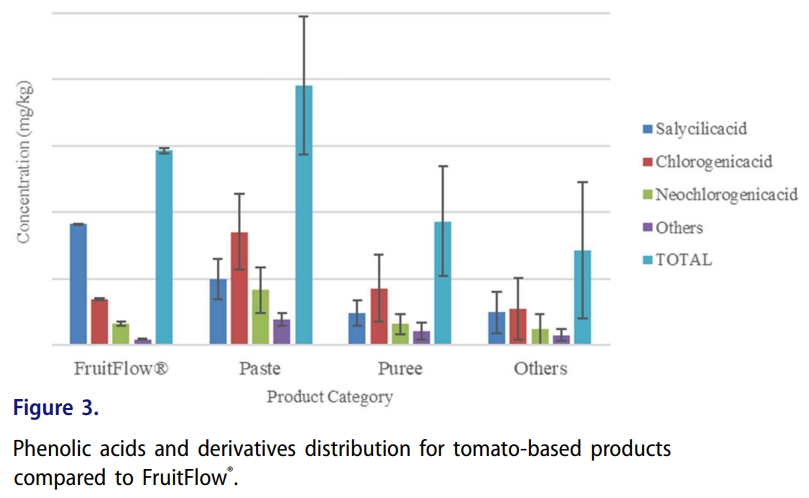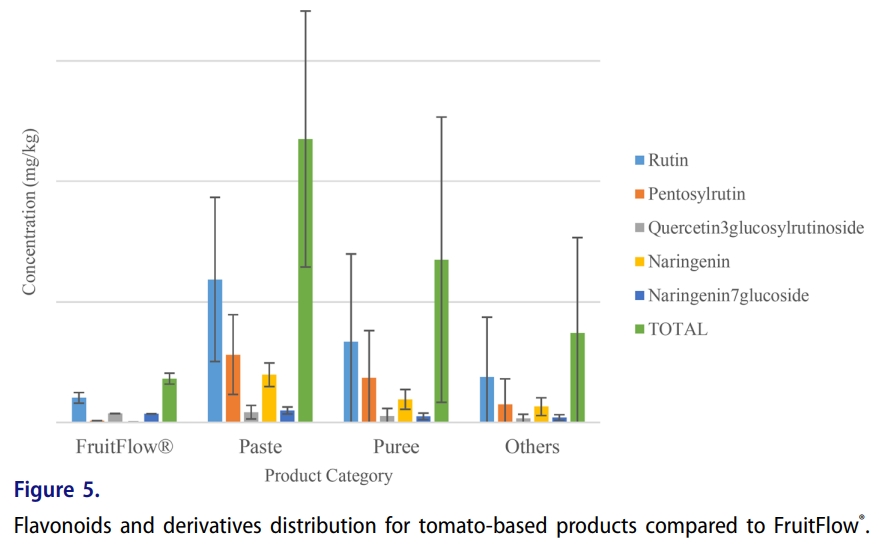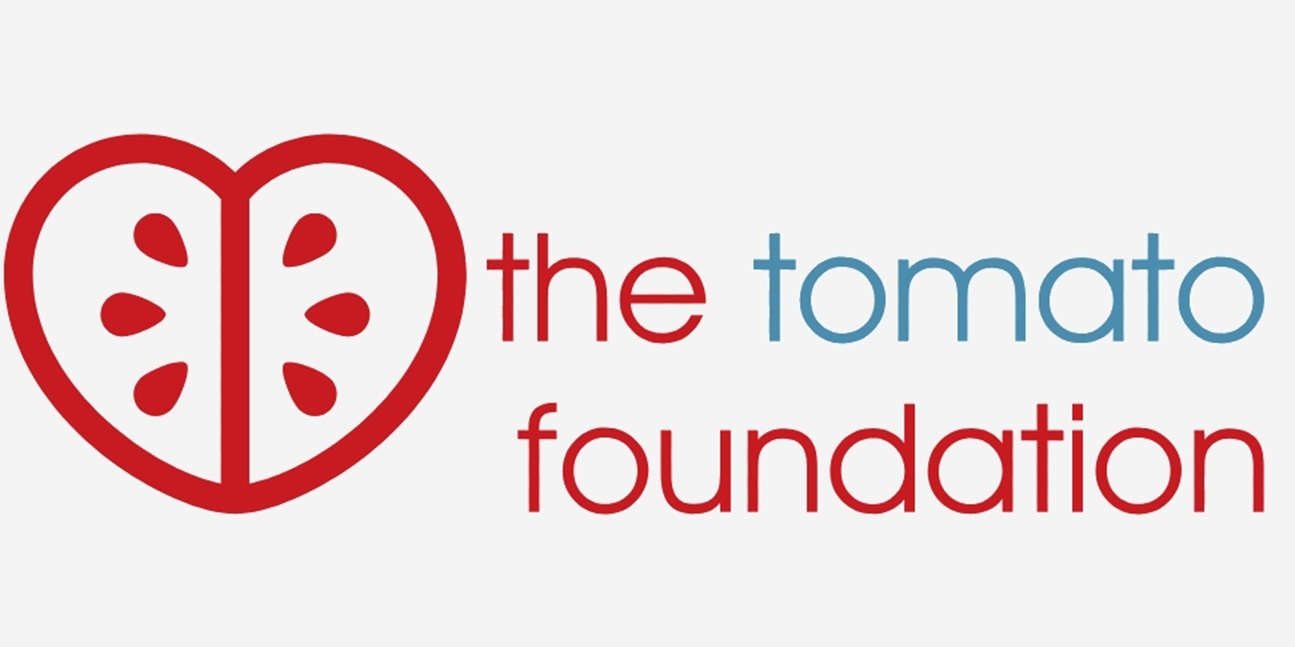Platelet hyperactivity: A comparison of water-soluble, bioactive compound levels in commercial tomato products and water-soluble tomato concentrate, a supplement with an approved EFSA antiplatelet health effect.
The aim of this study conducted by SSICA under the supervision of Pr. Luca Sandei was to evaluate and compare the concentration of water-soluble bioactive compounds in tomato products (polyphenols profile, water-soluble vitamins and nucleophilic substances) with the concentration of the same bioactive molecules existing in a water-soluble patented tomato extract, water-soluble tomato extract (WSTC), commercially available as FruitFlow®. This patented tomato extract has been recognized by EFSA (European Food Safety Authority) in a specific Health Claim declaration as having an “Antiplatelet health effect”. More than 100 commercial tomato samples, coming from 18 different processing tomato companies worldwide, were analyzed and compared with the FruitFlow® supplement. According to the multivariate statistical analyses applied to the data matrix, it is possible to conclude that the commercial tomato products measured (pastes, purees, others) show a significantly higher concentration of water-soluble bioactive molecules (nucleosides/nucleotides and polyphenols) responsible for an anti-platelet aggregation effect than the FruitFlow® dietary supplement.
Beyond the excerpts presented here, the presentation of the study is available by clicking here.

Consumer interest in improving well-being through clean, natural, sustainable foods and beverages has never been greater than it is currently.
With the increase of the average human life (from less than 50 to over 75 years in the last half-century), chronic diseases or “well-being society diseases" (heart disease, cancer, mental disorders, respiratory and digestive diseases) have consistently increased globally. Consequently, so have the costs that national governments face for public health systems (OECD et al. 2017).
Several scientific studies (Tresserra-Rimbau et al. 2014; Zamora-Ros et al. 2016; Agarwal et al. 2019; Mitchell et al. 2020) have shown that for every euro invested in disease prevention, three euros are saved in disease treatment. Moreover, given that more and more scientific evidences are determining the very close correlation between eating habits and health, it is clear, for instance, that the Mediterranean diet, characterized by a very well-balanced consumption of fruits, legumes, vegetables, olive oil, fish products, etc., precipitates safe and lasting beneficial effects and higher life expectancy, confirmed by statistical evidences (Tektonidis et al. 2016; Salas-Salvadó et al. 2018).
Tomato fruit, a major component of the “Mediterranean diet”, is often linked with a healthier lifestyle (Corpet and Gerber 1997; Grosso et al. 2017; Rao et al. 2018). Owing to the presence of a set of lipophilic and hydrophilic biomolecules, tomato products are a natural source of bioactive compounds such as carotenoids (lycopene, β-carotene, lutein, phytoene, etc.), vitamins C and A, and phenolic molecules such as flavonoids and phenolic acids and are also important sources of potassium, folates, fibres, unsaturated fatty acids and enzymes (Ali et al. 2021). The clinical and health scientific literature increasingly proves that a direct correlation exists between the consumption of foods rich in bioactive substances and positive effects on human health (Del Rio et al. 2010). In this context, vegetables in general, and more specifically tomato-based products, have always been considered foods containing multiple health-protecting bioactive molecules (Corpet and Gerber 1997; Grosso et al. 2017; Rao et al. 2018).
For these important nutritional characteristics, tomato products are considered very important worldwide in terms of public health and well-being.

FruitFlow® is a patented lycopene-free, water-soluble tomato concentrate extract (WSTC) owned by the DSM Company that has been evaluated by an EFSA NDA panel for its potential to reduce platelet aggregation, providing scientific evidence for two different products: WSTC I (completely water-soluble syrup) and WSTC II (a low-sugar derivative) in in-vitro and ex-vivo studies. In 2009, an EFSA NDA panel approved the specific claim: “Helps to maintain normal platelet aggregation, which contributes to healthy blood flow” under the category “emerging science” of the European Food Safety Authority (EFSA) (EFSA 2009; O’Kennedy et al. 2017).
DSM’s FruitFlow® is a dietary supplement made from bioactive compounds naturally found in the jelly around tomato seeds.
The aim of this study is therefore to verify and compare the concentration of water-soluble bioactive compounds naturally present in different tomato-based products coming from worldwide factories, with the actual concentration of those compounds in FruitFlow®, based on the recommended daily intake made by EFSA.

More than a hundred samples (107 in triplicate) of tomato-based products, coming from different producers globally, were divided into three different categories: pastes, purees and others (including tomato pulps, juices, peeled and sauces). A total of 18 companies from 11 countries worldwide (Argentina, Australia, China, Greece, Italy, Japan, Netherlands, Portugal, Spain, Ukraine, United States) joined this study, which represents the largest study conducted with the widest scientific collaboration of subjects related to the tomato industry sector ever organized.
Nucleotides and nucleosides are the main constituents presented in all tomato-based products and the food supplement, followed by phenolic acids and flavonoids.
Epidemiological findings confirm the beneficial effects on human health of different antioxidants contained in tomato fruits, whose amount and bioavailability can be modified by mechanical and heat treatments as well as the addition of ingredients such as oil or salt, characterizing the industrial transformation into the final products (Martínez-Huélamo et al. 2015).
According to the obtained results in this sample study, it is possible to conclude that the tomato-based products considered (Pastes, Purees, Others), show a significantly higher concentration of water-soluble bioactive molecules (nucleosides/nucleotides and polyphenols), responsible for an anti-platelet aggregation effect, than the same compounds assessed in FruitFlow® capsules, considering the recommended portion size suggested by the USDA.
With this work, scientists were able to demonstrate a direct correlation between WSTC and tomato derivatives that showed in a single standard serving of the tomato products examined a sufficient concentration of bioactive compounds needed to produce the claimed health effect on platelet aggregation recognized by EFSA.
Thanks to these results, the next step of the ongoing research will be to organize specific human trials to prove the anti-platelet health benefits of tomato products and their efficacy in the battle against CVD and emerging health threats.
 The authors are grateful to all the Tomato Foundation partnership, in particular to the 18 worldwide tomato companies that have supported this study. For further information, click here.
The authors are grateful to all the Tomato Foundation partnership, in particular to the 18 worldwide tomato companies that have supported this study. For further information, click here.
Reference:
Luca Sandei, Emanuela Cocconi, Carlotta Stingone, Maria Teresa Rapacciuolo, Francesco De Sio, Rosanna Vitelli, Andres Moreno Barreto, David Sutherland & Jonathan Hawkins (2023) Platelet hyperactivity: a comparison of water-soluble, bioactive compound levels in commercial tomato products and water-soluble tomato concentrate, a supplement with an approved EFSA antiplatelet health effect, International Journal of Food Sciences and Nutrition, DOI: 10.1080/09637486.2023.2270782
Sources: SSICA, Tomato Foundation


































